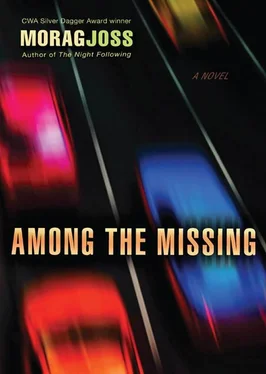I nodded over at Vi, who was sleeping behind the counter with dribble going on her cardigan.
Tell her, it’s her place, I said. She says she’s not running a bloody restaurant.
There was stuff from the Cash & Carry to price and put out, so when the fishermen left, I woke Vi up and told her I was going to the back room, not that she really heard. It was just cans and cotton wool and fire lighters and tinfoil, plus one of Vi’s impulse buys, a bag of soccer shirts, so there was no hurry. I took a sandwich past its sell-by from the chiller and made my tea, and when I’d had my lunch, I sent a message to you, but you didn’t answer; I thought you must be out of range, along the shore or getting water from the car-wash tap at the service station. Then I went back with a cup of tea for Vi and made her go across to the house. I told her to have a lie-down and I’d see her later, but I knew she’d have another bottle in there and I’d be locking up tonight. She wouldn’t go at first, she said the house would be cold. So I went over, and it was and also dirty, as always. I switched on the gas fires and her electric blanket and bedside light and then went back for her. I led her all the way to her bedroom door, and I promised her I’d look after everything. I hoped she’d fall asleep before she could start crying.
Soon after that a family came in. They’d been to the Netherloch Falls. There was a sulky girl chewing on a leaflet from there, and their feet were muddy. I didn’t like them. It was a weekday, so the children should have been in school. I made the man go outside with his cigarette even though it was only in his mouth and not lit. The woman asked if we had Internet access, and I told her no because I’d seen her wiping her nose with her hands. She said what’s that then, pointing at the sign outside, and I said it wasn’t working. For all I knew it wasn’t. Nobody had logged on for a couple of weeks. Then she shook out a rail of tartan scarves and tried them all on, even though there was no mirror and they were only scarves. After that she took a basket and went up and down the shelves helping herself, digging in the freezer and handing out ice creams to her children before she’d paid for them. I told them there was no eating in the shop, so they hung around staring at me and sucking and tugging at their ice cream wrappers and fingering the chocolate bars and playing with the key rings in the “Under £3” tray. I’m sure they took some. The eldest one kept whining to her mother about why there wasn’t a toilet and when could she get on Facebook.
After they’d gone, I sent you another message and told you what they were like, but you were still out of range.
Then it was quiet again for a while. A man came in, someone I remembered seeing before. He came in now and then, always in outdoor clothes like the men who ran the angling weekends or worked in the forest, but he was always by himself and he was older than most of them. Not that I could really guess his age. He had cropped hair that I thought would be silvery gray if it were longer. When he brought his things to the register, he smiled as if he knew me. I noticed the color of his eyes again, a bluish gray like the color of water in winter, and there was a brightness in them, almost a flashing, as if he had just caught sight of something startling, not in me but in the air surrounding me. But he was friendly. I remember thinking he was the first person I’d seen smiling since Anna waved me goodbye that morning, and my face felt a little unaccustomed to smiling back. I forgot how it showed, worrying all the time. He said something I didn’t hear.
“Sorry, what did you say?”
“Nothing, doesn’t matter. You were miles away,” he said, still smiling.
I laughed and started to ring up his purchases. “Yes, I was. Sorry.”
“Good place to be, sometimes. I think so, anyway.”
The radio was on as usual, and I also remember there had just been a commercial break and a time check. That was how I was sure exactly when it happened. Two forty-five. He’d bought milk, a can of beans, cheese and tomatoes and bread, I remember that as well.
“You’re not Polish, are you?” he asked. “Where are you from, then?”
“Me? I’m from miles away,” I said and rang the register.
“Well, that’s two of us,” he said, and we laughed in the way people laugh when they want to show something doesn’t matter but it does.
Then the first sound of it came. It rolled at us like a shape, a dark color, a giant boulder. Other sounds were squashed under it: the radio, the ting of the register, my voice counting out change. I stopped trying to count, and we stood staring at each other, then I began to feel the noise as well as hear it; it came from underground and rumbled up through my legs and into my throat, it was rattling the words I was trying to say against my teeth as if my mouth were full of buttons. The man was trying to speak, too, but his lips just opened and closed. Then this underground roaring rose and grew into a jagged crashing and breaking over our heads. Vi came hurrying in from the house, through the back of the shop and heading straight for the doors.
“Oh, Jesus!” she was shouting. “Jesus, what is it? Is it a plane? Jesus, it’s a plane crashed at Inverness!”
We all went outside, our three faces raised to the sky.
It wasn’t a plane, but the noise was coming from the direction of Inverness. Faraway sirens started to wail. A couple of cars stopped dead on their way up the road, and people got out of them shouting, and two or three of them ran back, eastward, toward the noise. A moment later a car coming up the other side from Netherloch braked suddenly and swerved in at the side of the road just past the turnoff and our parking area; two bikes on the roof shuddered and slipped forward onto the hood. The door swung open, and the driver stumbled in our direction with his phone at his ear.
“Oh, my God! The bridge? The bridge? Fuck! It’s going down, the bridge is going down!” His voice was squealing and jerky. “Oh, my God! Are you okay, are you okay? Yes, yes, all right. Oh, my God! You stay there. You stay where you are. Don’t move, okay? Oh my God!” He ended the call and for a moment stood rooted, staring at the phone and pulling his hair. More cars were stopping, more people were swarming on the road. He came toward us, waving his arms. “The bridge! Hey, it’s the bridge! Something’s happened to the bridge! It’s going down!”
His voice pulled other people in a circle around him. “It’s the bridge! She saw it! My wife, she saw it! She’s in her office, they’re on the twelfth floor, riverside, they all saw it! It’s gone down, the bridge is down, they can’t leave the building. It could be a bomb!”
From here there was nothing to see but the road and the forest that grew right to its edges. From Vi’s place you had to cross the road and climb in through the pines and go right up to the head of the waterfall to get a sight of the other side, the town and the falls tumbling down and the river stretching away from the east corner of the loch, and on toward the bridge and beyond that, Inverness docks and the ocean. There was a moment of disappointment while we all stood, listening. The noises around us were changing. The roar lessened to a low rumble under the screams of more sirens. Everyone had turned in the direction of the city. Then a man in a checked shirt tugged at his wife’s arm. “Come on! Come on, then!” he said, and ran toward the trees. The woman glanced at us and followed him.
It was all the rest of them needed. The excitement returned. Of course they had to see for themselves. Suddenly it was all right to run after a glimpse of it. People headed for the trees. Cars were still pulling up and stopping, and soon there were ten or twelve banked up in both directions. Some drivers wanted to move on, but the road was too narrow for them to get around the cars blocking them. They leaned on their horns and got out and stood with their hands on their hips or went striding up to the vehicles in front. Other people fished around in car trunks for boots and cameras and followed the others making for the trees. One couple quickly unhitched their bikes from the back of their car and set off down the road, weaving through the line of stopped traffic. Even though she had no coat, Vi pitched forward and joined the flow of people disappearing into the woods. She turned back once and shouted something at me, but I didn’t hear what. Probably something about minding the store, which she knew I would do anyway. When I looked round, the man had gone, too. He had left his bag of food on the bench outside.
Читать дальше












